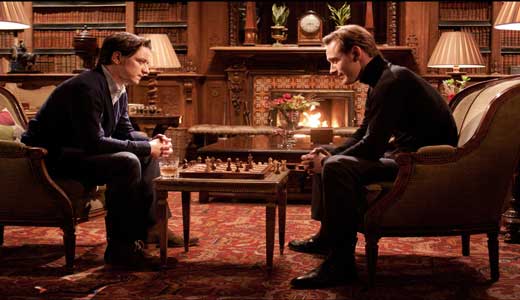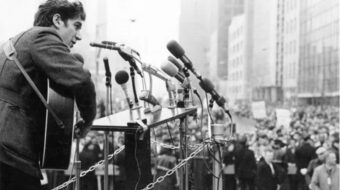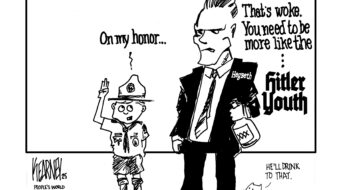
Movie Review
X-Men: First Class
Directed by Matthew Vaughn
Starring James McAvoy, Michael Fassbender, Kevin Bacon, Jennifer Lawrence
2011, 132 minutes, PG-13
A prequel to the original X-Men trilogy, First Class takes place during the Cuban Missile Crisis and focuses on the relationship between Professor X (James McAvoy) and Magneto (Michael Fassbender). The two mutants unite to form the very first incarnation of the X-Men, in order to combat the Hellfire Club, a group led by Sebastian Shaw (Kevin Bacon), who attempts to manipulate the U.S. and the Soviet Union into engaging in nuclear war.
The film begins with a scene in 1944 Nazi-occupied Poland, where young Erik Lensherr, a.k.a Magneto, accidentally bends a metal gate with his mind. Sebastian Shaw, in an effort to “activate” Lensherr’s mutant ability again to serve his own needs, provokes the boy’s rage by killing his mother.
The plot then jumps forward to 1962, in which Charles Xavier, a.k.a. “Professor X,” an Oxford University graduate, is living with surrogate sister Mystique (Jennifer Lawrence). Xavier soon meets and befriends Lensherr, and, along with Mystique, they decide to aid the CIA in order to stop the Hellfire Club. They are able to locate other mutants, who, as X-Men, band together to prevent a war.
As the story progresses, tensions between Xavier and Magneto increase, with Magneto beginning to share Shaw’s negative outlook on humanity.
Every class should be “first class”
This film had an abstract, yet powerful, social message. It remained loyal to the original comics, in which, over the years, there have been gay X-Men, communist X-Men, black X-Men and Jewish X-Men. The series has, through its mutant stories, always made allusions to real-world issues of racism and discrimination. It has always been outspoken in its defense of those who are unfairly judged by society.
In terms of keeping up that tradition, this film did not disappoint me.
An accurate, if alternate, history
While First Class intersperses the era of the Cuban Missile Crisis with mutant interference, it also gets the important facts straight. For one, the film is critical of U.S. policy during this time period, and readily depicts the U.S. placing missiles in Turkey in April 1962. Furthermore, the film seems, in its approach, to outline positive aspects of communism during that era.
Nevertheless, the film did omit an important aspect of the time period it covered. 1962 was a year in which so many poignant events took place in regard to the civil rights struggle. But, curiously, First Class addressed the fight for equal rights only indirectly – if at all. It might have been wise for the story to have highlighted significant events of that era, such as the race riot that arose when the University of Mississippi saw its first black student, or an African-American being asked to speak at the Lincoln Memorial. Instead, the film attacked Nazism, which, while a positive move, many would see as all too familiar and comfortable.
However, James McAvoy felt there were references (albeit subtle ones) to that early 60s’ struggle; he felt that Xavier and Magneto drew comparisons to Martin Luther King Jr. and Malcolm X. He told IGN, “I think that is something that is really strong in the X-Men dynamic between these two men who both want the same thing really. In this film it’s sort of like meeting them at a point where they are still finding out who they are,” through “some of the key events in the sort of equal rights or civil rights struggle that helped shape them.”
More than a superhero film
“First Class” did sacrifice a lot of action that oversaturates films today, but in its place, provided superb acting (McAvoy played an Xavier that ought to make Patrick Stewart proud), exceptional dialogue, and solid writing. And, unlike a lot of modern superhero films, the plot was concise, straightforward and free of holes.
After X-Men’s disappointing 2009 Wolverine spinoff, expectations were low for this film. But as it turned out, not only did this appear to be the best X-Men film so far, but also one of the best comic book adaptations I’ve ever seen – a contender even for film giants like The Dark Knight.
This is more than a comic book film – it is a profound cinematic work of historical fiction. Its story is so compelling, in fact, that halfway through it all, I forgot that I was watching a movie about men with blue fur and psychic powers.
Photo: In a promotional photo released by 20th Century Fox, James McAvoy (left), portrays Professor X, opposite Michael Fassbender, who plays Magneto. In the film, the friends-turned-enemies have very different ideas on how to view human-mutant relations. Murray Close, AP Photos/20th Century Fox.










